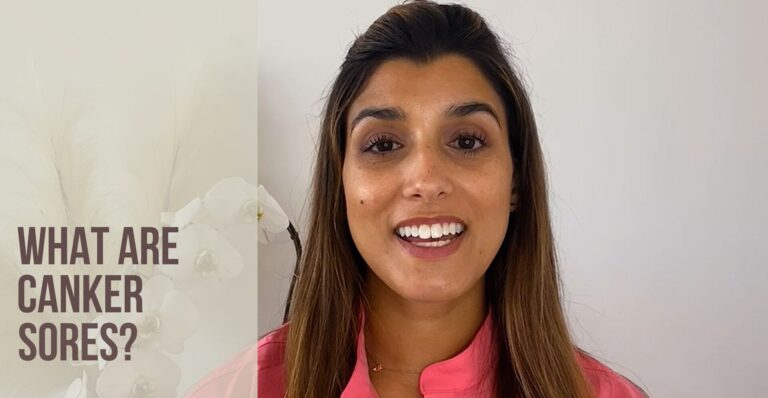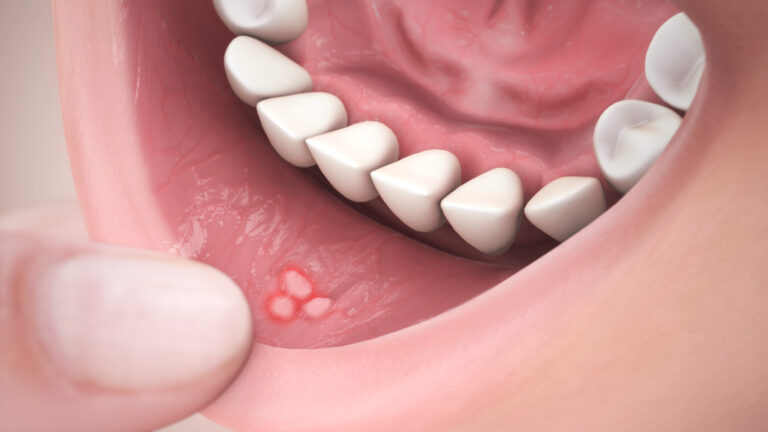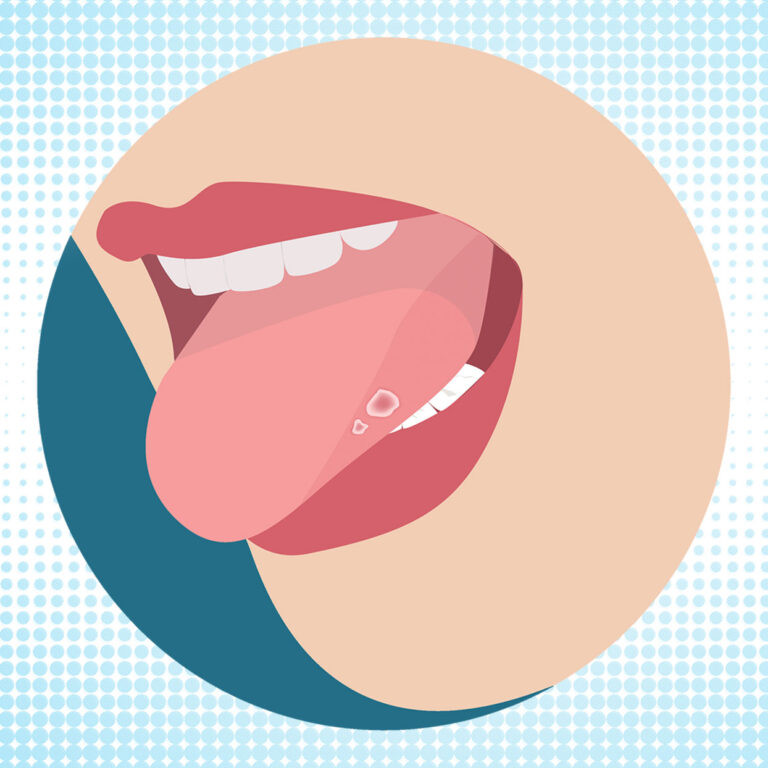CANKER SORE – SYMPTOMS, CAUSES, AND TREATMENT
Canker sores , also known as aphthous ulcers, are small, shallow lesions that form on the soft tissues in your mouth or at the base of your gums. In contrast to cold sores, canker sores do not happen on the surface of your lips and they are not contagious. They could be painful, however, and could make eating and talking difficult.

Most canker sores go away on their own within a week or so. Check with your doctor or dentist if you have uncommonly large or painful canker sores or canker sores that do not seem to heal.
SYMPTOMS
The majority of canker sores are round or oval with a white or yellow center and a red border. They develop inside your mouth — on or under your tongue, inside your cheeks or lips, at the base of your gums, or on your soft palate. You may notice a tingling or burning feeling a day or two before the sores actually appear.
There are various types of canker sores, including minor, major, and herpetiform sores.
Minor canker sores
- Minor canker sores are the more common and:
- Are generally small
- Are oval-shaped with a red border
- Heal with no scars within one to two weeks
Major canker sores
- Major canker sores are less common and:
- Are bigger and deeper than minor canker sores
- Are usually round with defined borders, but might have irregular edges when very large
- Could be extremely painful
- Might take up to six weeks to heal and could leave extensive scarring

Herpetiform canker sores
Herpetiform canker sores are unusual and generally develop later in life, but they are not caused by herpes virus infection. These canker sores:
- Are pinpoint size
- Usually, happen in clusters of 10 to 100 sores, but might merge into one large ulcer
- Have irregular edges
- Heal with no scars within one to two weeks
WHEN SHOULD YOU SEE A DOCTOR?
Consult your doctor if you experience:
- Uncommonly large canker sores
- Recurring sores, with new ones developing prior to old ones healing, or frequent outbreaks
- Continuous sores, lasting two weeks or more
- Sores that extend within the lips themselves (vermilion border)
- Pain that you cannot control with self-care measures
- Extreme trouble eating or drinking
- High fever along with canker sores
Consult your dentist if you have sharp tooth surfaces or dental appliances that seem to trigger the sores.
CAUSES
The exact cause of canker sores remains unclear, though researchers suspect that a combination of factors contributes to outbreaks, even in the same person.
Possible triggers for canker sores are:
- A minor injury to your mouth from dental work, overzealous brushing, sports accidents, or an accidental cheek bite
- Toothpaste and mouth rinses consisting of sodium lauryl sulfate
- Food sensitivities, especially to chocolate, coffee, strawberries, eggs, nuts, cheese, and spicy or acidic foods
- A diet that is short of vitamin B-12, zinc, folate (folic acid), or iron
- An allergic response to specific bacteria in your mouth
- Helicobacter pylori, the very same bacteria that cause peptic ulcers
- Hormonal shifts during menstruation
- Emotional stress
Canker sores might also happen because of specific conditions and diseases, such as:
- Celiac disease is a severe intestinal disorder caused by a sensitivity to gluten, a protein found in most grains
- Inflammatory bowel diseases, like Crohn’s disease and ulcerative colitis
- Behcet’s disease is an uncommon disorder that causes inflammation throughout the body, including the mouth
- A faulty immune system that attacks healthy cells in your mouth instead of pathogens, like viruses and bacteria
- HIV/AIDS, which suppresses the immune system
In contrast to cold sores, canker sores are not related to herpes virus infections.

RISK FACTORS
Anyone could develop canker sores. But they happen more often in teens and young adults, and they are more common in females.
Usually, people with recurrent canker sores have a family history of the disorder. This might be because of heredity or a shared factor in the environment, like specific foods or allergens.
PREVENTION
Canker sores usually recur, but you might be able to reduce their frequency by following these tips:
- Watch what you eat – Try to stay away from foods that seem to irritate your mouth. These might include nuts, chips, pretzels, specific spices, salty foods, and acidic fruits, like pineapple, grapefruit, and oranges. Stay away from any foods to which you are sensitive or allergic.
- Choose healthy foods – To help stop nutritional deficiencies, eat plenty of fruits, vegetables, and whole grains.
- Follow good oral hygiene habits – Regular brushing after meals and flossing once a day could keep your mouth clean and free of foods that may trigger a sore. Use a soft brush to help prevent irritation to delicate mouth tissues, and avoid toothpaste and mouth rinses that consist of sodium lauryl sulfate.
- Protect your mouth – If you have braces or other dental appliances, check with your dentist about orthodontic waxes to cover the sharp edges.
- Reduce your stress – If your canker sores seem to be associated with stress, learn and use stress-reduction techniques, like meditation and guided imagery.
DIAGNOSIS
Tests are not required to diagnose canker sores. Your doctor or dentist could identify them with a visual examination. In some cases, you might have tests to check for other health problems, particularly if your canker sores are severe and ongoing.
TREATMENT
Treatment generally is not required for minor canker sores, which tend to clear on their own in a week or two. But large, persistent or uncommonly painful sores usually require medical care. A lot of treatment options exist.
Mouth rinses
If you have several canker sores, your doctor might prescribe a mouth rinse containing the steroid dexamethasone to lower pain and inflammation or lidocaine to lower pain.
Topical products
Over-the-counter and prescription products (pastes, creams, gels, or liquids) might help relieve pain and speed healing if applied to individual sores as soon as they appear. Some products have active ingredients, like:
- Benzocaine (Anbesol, Kank-A, Orabase, Zilactin-B)
- Fluocinonide (Lidex, Vanos)
- Hydrogen peroxide (Orajel Anti-septic Mouth Sore Rinse, Peroxyl)
There are numerous other topical products for canker sores, including those without active ingredients. Ask your doctor or dentist for advice on which might work best for you.

Oral medications
Oral medications might be used when canker sores are severe or do not respond to topical treatments. These might include:
- Medications are not intended specifically for canker sore treatment, as the intestinal ulcer treatment sucralfate (Carafate) is used as a coating agent, and colchicine, which is generally used to treat gout.
- Oral steroid medications when serious canker sores do not respond to other treatments. But because of severe side effects, they are generally a last resort.
Cautery of sores
During cautery, an instrument or chemical substance is used to burn, cauterize or destroy tissue.
- Debacterol is a topical solution designed to treat canker sores and gum issues. By chemically cauterizing canker sores, this medication might lower healing time to about a week.
- Silver nitrate — another option for chemical cautery of canker sores — has not been shown to speed healing, but it might help relieve canker sore pain.
Nutritional supplements
Your doctor might prescribe a nutritional supplement if you consume low amounts of important nutrients, like folate (folic acid), vitamin B-6, vitamin B-12, or zinc.
Related health problems
If your canker sores relate to a more severe health problem, your doctor will treat the underlying condition.
If you or anyone you know is suffering from canker sore, our expert providers at Specialty Care Clinics will take care of your health and help you recover.
Call us on (469) 545-9983 to book an appointment with our specialists.
